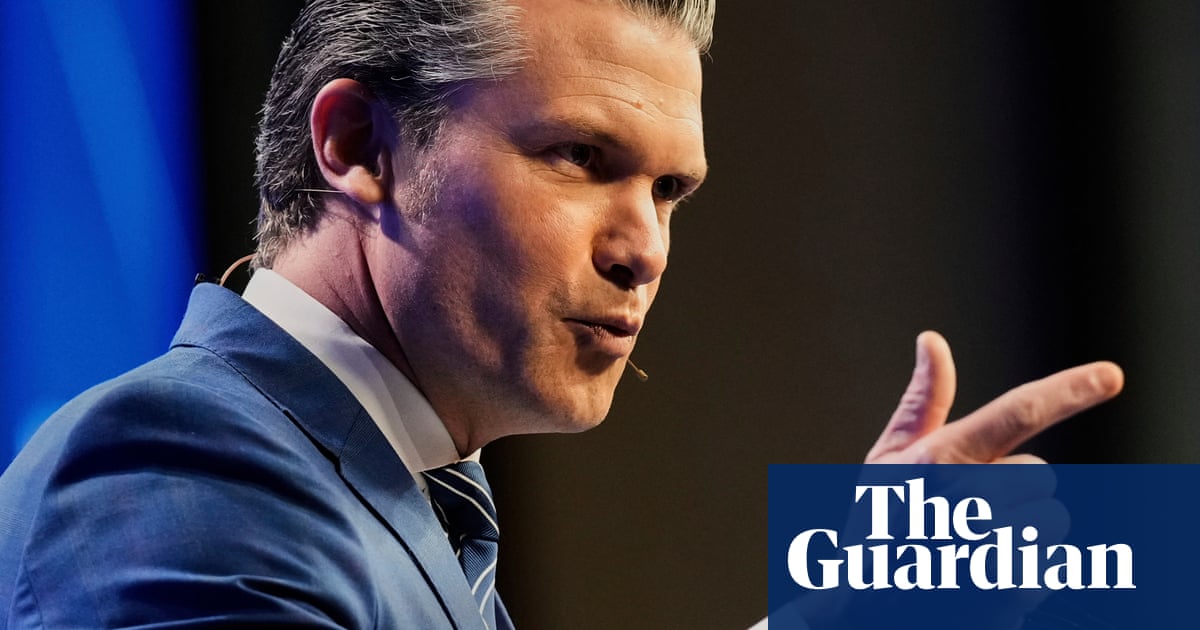China’s government has accusedPete Hegsethof trying to “sow division” in the Asia Pacific region over his speech at a Singapore defence conference where he warned China was a potentially “imminent” threat.
On Saturday Hegseth saidChina was “credibly preparing to potentially use military force to alter the balance of power in the Indo-Pacific”, and was rehearsing for “the real deal” of invading Taiwan.
“There’s no reason to sugar coat it. The threatChinaposes is real, and it could be imminent,” the US defence secretary said in a keynote address at the Shangri-la Dialogue defence forum, calling for Asian countries to increase defence spending.
On Sunday, China’s ministry of foreign affairs condemned his words, which it said were “filled with provocations and intended to sow division”.
“Hegseth deliberately ignored the call for peace and development by countries in the region, and instead touted the cold war mentality for bloc confrontation, vilified China with defamatory allegations, and falsely called China a ‘threat’,” it said.
“The remarks were filled with provocations and intended to sow division. China deplores and firmly opposes them and has protested strongly to the US.”
The statement also pushed back at Hegseth’s claim that China was trying to become a “hegemonic power” in the region.
“No country in the world deserves to be called a hegemonic power other than the US itself, who is also the primary factor undermining the peace and stability in the Asia-Pacific,” it said.
The ministry accused Hegseth of “playing with fire” with what it calls “theTaiwanquestion”. China’s ruling Communist party (CCP) claims Taiwan is a province of China, illegally run by separatists, and has vowed to annex it. Taiwan’s democratically elected government and the majority of its people reject the prospect of CCP rule.
Speaking to reporters on Sunday morning, Australia’s defence minister, Richard Marles, rejected the premise of China’s criticism of Hegseth.
“What we have seen from China is the single biggest increase in military capability and buildup in a conventional sense by any country since the end of the second world war,” he said.
“That is one of the key features of the complexity of the strategic landscape which all of us face within the region and which is faced around the world.”
Marles said Australia had worked with regional partners including the US and the Philippines “over a long period of time to uphold the global rules-based order”, including freedom of navigation operations to assert the UN convention on the law of the sea.
The US is not a signatory to that convention.
The Shangri-la Dialogue is an annual conference that hosts dozens of leaders, defence ministers and military chiefs from around the world, for three days of panel discussions and speeches. But much of the significant interactions occur on the sidelines, with private meetings between representatives. Past years have often seenthe US and China trade barbs, but also occasionally hold significant meetings,including last yearwith China’s defence minister, Dong Jun, and Hegseth’s predecessor, Lloyd Austin.
This year, however, China sent only a small delegation led by a vice-president of the People’s Liberation Army’s national defence university, Rear Adm Hu Gangfeng.
On Saturday afternoon Hu told a panel, which included the head of the British armed forces, that speakers had attempted to “provoke, split and instigate confrontations in the region” with criticisms of China.
He said the maritime situation in the region was “generally stable” but faced “severe challenges”, and accused unnamed countries of increasing military presences and infringing on territorial sovereignty of others “in the name of so-called freedom of navigation” and supporting “Taiwan independence separatist forces”.
China claims much of the South China Sea, where there are overlapping claims of sovereignty among several countries. It has rejected a ruling by The Hague that its claims are unlawful.
Later on Sunday, Singapore’s defence minister, Chan Chun Sing, told a panel that it was crucial China and the world properly understand each other. Referencing China’s absence, Chan said Beijing should use “every opportunity” available get its position across.
“But regardless of whether China attends the [dialogue], it is incumbent on all of us to reach out to China in different forums … to not end up in a situation where either side misinterprets, miscalculates, or misrepresents each other’s position. That is dangerous.”
